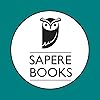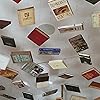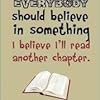Poll

John Adams - PRESIDENTIAL SERIES
This poll will examine the choices for the John Adams upcoming reading selection which will be the next President covered in the Presidential Series (after Madison). The order for the Presidents selected was determined by the group membership in a recently completed poll. The results are posted.
This selection will begin in 2018 and will continue for three - four months - depending upon the length of the selection. Some selections will take a long time so rather than begin this selection around Christmas or other important religious or family holidays, we are waiting until 2018 to begin the John Adams selection and we will have completed the Madison book by then.
We have added all of the books nominated on the John Adams thread and a few others. However, if you do not see your favorite book on this list; then just comment or pop me a note and I will immediately add it to this poll or you can write it in - but make sure that you select from the list the correct book and author. Also make sure that it is not already listed. If I find a duplicate, I will delete it.
You can always change your vote at any time; so nothing is lost. Some of the John Adams's books deal with only a certain period of his life, some may be multi-volume (if that is ever the case - I always add both separately), some deal with other topics too; some are all encompassing, others deal with specific events in Adam's life or presidency and others are by the man, himself and some may be about other relationships or focused on specific issues during his life or presidency or even his wife and first lady - Abigail Adams. Others deal with some of the other founding fathers as well. So select wisely.
Before making your selection, please try to look up your choice and make sure it really is a book you are interested in; do not be lured in by the title. Also, check out the author and what others have said about the book before you (reviewers who you trust). Then of course, make your selection.
Bentley
Note: Be careful when making your selection: a great many of these books have the same title (John Adams) so be careful to make the right choice.
This poll will examine the choices for the John Adams upcoming reading selection which will be the next President covered in the Presidential Series (after Madison). The order for the Presidents selected was determined by the group membership in a recently completed poll. The results are posted.
This selection will begin in 2018 and will continue for three - four months - depending upon the length of the selection. Some selections will take a long time so rather than begin this selection around Christmas or other important religious or family holidays, we are waiting until 2018 to begin the John Adams selection and we will have completed the Madison book by then.
We have added all of the books nominated on the John Adams thread and a few others. However, if you do not see your favorite book on this list; then just comment or pop me a note and I will immediately add it to this poll or you can write it in - but make sure that you select from the list the correct book and author. Also make sure that it is not already listed. If I find a duplicate, I will delete it.
You can always change your vote at any time; so nothing is lost. Some of the John Adams's books deal with only a certain period of his life, some may be multi-volume (if that is ever the case - I always add both separately), some deal with other topics too; some are all encompassing, others deal with specific events in Adam's life or presidency and others are by the man, himself and some may be about other relationships or focused on specific issues during his life or presidency or even his wife and first lady - Abigail Adams. Others deal with some of the other founding fathers as well. So select wisely.
Before making your selection, please try to look up your choice and make sure it really is a book you are interested in; do not be lured in by the title. Also, check out the author and what others have said about the book before you (reviewers who you trust). Then of course, make your selection.
Bentley
Note: Be careful when making your selection: a great many of these books have the same title (John Adams) so be careful to make the right choice.
John Adams
Adams Vs. Jefferson: The Tumultuous Election of 1800
John Adams: A Life
My Dearest Friend: Letters of Abigail and John Adams
Founding Brothers: The Revolutionary Generation
Abigail Adams
First Family: Abigail and John Adams
The Meaning of Independence: John Adams, George Washington, and Thomas Jefferson
Dear Abigail: The Intimate Lives and Revolutionary Ideas of Abigail Adams and Her Two Remarkable Sisters
Passionate Sage: The Character and Legacy of John Adams
John Adams: Party of One
The First Presidential Contest: 1796 and the Founding of American Democracy
Friends Divided: John Adams and Thomas Jefferson
Adams-Jefferson Letters
Diplomacy in Black and White: John Adams, Toussaint Louverture, and Their Atlantic World Alliance
The Portable John Adams
Presidential Courage: Brave Leaders & How They Changed America 1789-1989
America Afire: Jefferson, Adams, and the Revolutionary Election of 1800
John Adams and the Spirit of Liberty
John Adams and the American Revolution
Abigail and John: Portrait of a Marriage
Abigail Adams: A Biography
Revolutionary Writings 1755-1775
The Presidency of John Adams: The Collapse of Federalism, 1795-1800
Dearest Friend: A Life of Abigail Adams
John Adams's Republic: The One, the Few, and the Many
The Presidency of John Adams (American Presidency)
Liberty's First Crisis: Adams, Jefferson, and the Misfits Who Saved Free Speech
Poll added by: Bentley
Comments Showing 1-41 of 41 (41 new)
date newest »
newest »
 newest »
newest »
message 1:
by
Bentley
(new)
Aug 30, 2017 05:15PM
 Mod
Mod
reply
|
flag
John Adams
 by
by
 David McCullough
David McCullough
Synopsis:
In this powerful, epic biography, David McCullough unfolds the adventurous life-journey of John Adams, the brilliant, fiercely independent, often irascible, always honest Yankee patriot -- "the colossus of independence," as Thomas Jefferson called him -- who spared nothing in his zeal for the American Revolution; who rose to become the second President of the United States and saved the country from blundering into an unnecessary war; who was learned beyond all but a few and regarded by some as "out of his senses"; and whose marriage to the wise and valiant Abigail Adams is one of the moving love stories in American history.
Like his masterly, Pulitzer Prize-winning biography Truman, David McCullough's John Adams has the sweep and vitality of a great novel. It is both a riveting portrait of an abundantly human man and a vivid evocation of his time, much of it drawn from an outstanding collection of Adams family letters and diaries. In particular, the more than one thousand surviving letters between John and Abigail Adams, nearly half of which have never been published, provide extraordinary access to their private lives and make it possible to know John Adams as no other major American of his founding era.
As he has with stunning effect in his previous books, McCullough tells the story from within -- from the point of view of the amazing eighteenth century and of those who, caught up in events, had no sure way of knowing how things would turn out. George Washington, Benjamin Franklin, John Jay, the British spy Edward Bancroft, Madame Lafayette and Jefferson's Paris "interest" Maria Cosway, Alexander Hamilton, James Madison, the scandalmonger James Callender, Sally Hemings, John Marshall, Talleyrand, and Aaron Burr all figure in this panoramic chronicle, as does, importantly, John Quincy Adams, the adored son whom Adams would live to see become President.
Crucial to the story, as it was to history, is the relationship between Adams and Jefferson, born opposites -- one a Massachusetts farmer's son, the other a Virginia aristocrat and slaveholder, one short and stout, the other tall and spare. Adams embraced conflict; Jefferson avoided it. Adams had great humor; Jefferson, very little. But they were alike in their devotion to their country.
At first they were ardent co-revolutionaries, then fellow diplomats and close friends. With the advent of the two political parties, they became archrivals, even enemies, in the intense struggle for the presidency in 1800, perhaps the most vicious election in history. Then, amazingly, they became friends again, and ultimately, incredibly, they died on the same day -- their day of days -- July 4, in the year 1826.
Much about John Adams's life will come as a surprise to many readers. His courageous voyage on the frigate Boston in the winter of 1778 and his later trek over the Pyrenees are exploits that few would have dared and that few readers will ever forget.
It is a life encompassing a huge arc -- Adams lived longer than any president. The story ranges from the Boston Massacre to Philadelphia in 1776 to the Versailles of Louis XVI, from Spain to Amsterdam, from the Court of St. James's, where Adams was the first American to stand before King George III as a representative of the new nation, to the raw, half-finished Capital by the Potomac, where Adams was the first President to occupy the White House.
This is history on a grand scale -- a book about politics and war and social issues, but also about human nature, love, religious faith, virtue, ambition, friendship and betrayal, and the far-reaching consequences of noble ideas. Above all, John Adams is an enthralling, often surprising story of one of the most important and fascinating Americans who ever lived.
Awards:
Pulitzer Prize for Biography or Autobiography (2002), Christopher Award, Ambassador Book Award for Biography (2002), Audie Award for Nonfiction (2002), Puddly Award for Nonfiction (2002), American Revolution Round Table Award (2001
 by
by
 David McCullough
David McCulloughSynopsis:
In this powerful, epic biography, David McCullough unfolds the adventurous life-journey of John Adams, the brilliant, fiercely independent, often irascible, always honest Yankee patriot -- "the colossus of independence," as Thomas Jefferson called him -- who spared nothing in his zeal for the American Revolution; who rose to become the second President of the United States and saved the country from blundering into an unnecessary war; who was learned beyond all but a few and regarded by some as "out of his senses"; and whose marriage to the wise and valiant Abigail Adams is one of the moving love stories in American history.
Like his masterly, Pulitzer Prize-winning biography Truman, David McCullough's John Adams has the sweep and vitality of a great novel. It is both a riveting portrait of an abundantly human man and a vivid evocation of his time, much of it drawn from an outstanding collection of Adams family letters and diaries. In particular, the more than one thousand surviving letters between John and Abigail Adams, nearly half of which have never been published, provide extraordinary access to their private lives and make it possible to know John Adams as no other major American of his founding era.
As he has with stunning effect in his previous books, McCullough tells the story from within -- from the point of view of the amazing eighteenth century and of those who, caught up in events, had no sure way of knowing how things would turn out. George Washington, Benjamin Franklin, John Jay, the British spy Edward Bancroft, Madame Lafayette and Jefferson's Paris "interest" Maria Cosway, Alexander Hamilton, James Madison, the scandalmonger James Callender, Sally Hemings, John Marshall, Talleyrand, and Aaron Burr all figure in this panoramic chronicle, as does, importantly, John Quincy Adams, the adored son whom Adams would live to see become President.
Crucial to the story, as it was to history, is the relationship between Adams and Jefferson, born opposites -- one a Massachusetts farmer's son, the other a Virginia aristocrat and slaveholder, one short and stout, the other tall and spare. Adams embraced conflict; Jefferson avoided it. Adams had great humor; Jefferson, very little. But they were alike in their devotion to their country.
At first they were ardent co-revolutionaries, then fellow diplomats and close friends. With the advent of the two political parties, they became archrivals, even enemies, in the intense struggle for the presidency in 1800, perhaps the most vicious election in history. Then, amazingly, they became friends again, and ultimately, incredibly, they died on the same day -- their day of days -- July 4, in the year 1826.
Much about John Adams's life will come as a surprise to many readers. His courageous voyage on the frigate Boston in the winter of 1778 and his later trek over the Pyrenees are exploits that few would have dared and that few readers will ever forget.
It is a life encompassing a huge arc -- Adams lived longer than any president. The story ranges from the Boston Massacre to Philadelphia in 1776 to the Versailles of Louis XVI, from Spain to Amsterdam, from the Court of St. James's, where Adams was the first American to stand before King George III as a representative of the new nation, to the raw, half-finished Capital by the Potomac, where Adams was the first President to occupy the White House.
This is history on a grand scale -- a book about politics and war and social issues, but also about human nature, love, religious faith, virtue, ambition, friendship and betrayal, and the far-reaching consequences of noble ideas. Above all, John Adams is an enthralling, often surprising story of one of the most important and fascinating Americans who ever lived.
Awards:
Pulitzer Prize for Biography or Autobiography (2002), Christopher Award, Ambassador Book Award for Biography (2002), Audie Award for Nonfiction (2002), Puddly Award for Nonfiction (2002), American Revolution Round Table Award (2001
The First Presidential Contest: 1796 and the Founding of American Democracy
 by Jeffrey L. Pasley (no photo)
by Jeffrey L. Pasley (no photo)
Synopsis:
This is the first study in half a century to focus on the election of 1796. At first glance, the first presidential contest looks unfamiliar—parties were frowned upon, there was no national vote, and the candidates did not even participate (the political mores of the day forbade it). Yet for all that, Jeffrey L. Pasley contends, the election of 1796 was “absolutely seminal,” setting the stage for all of American politics to follow.
Challenging much of the conventional understanding of this election, Pasley argues that Federalist and Democratic-Republican were deeply meaningful categories for politicians and citizens of the 1790s, even
if the names could be inconsistent and the institutional presence lacking. He treats the 1796 election as a rough draft of the democratic presidential campaigns that came later rather than as the personal squabble depicted by other historians. It set the geographic pattern of New England competing with the South at the two extremes of American politics, and it established the basic ideological dynamic of a liberal, rights-spreading American left arrayed against a conservative, society-protecting right, each with its own competing model of leadership.
Rather than the inner thoughts and personal lives of the Founders, covered in so many other volumes, Pasley focuses on images of Adams and Jefferson created by supporters—and detractors—through the press, capturing the way that ordinary citizens in 1796 would have actually experienced candidates they never heard speak. Newspaper editors, minor officials, now forgotten congressman, and individual elector candidates all take a leading role in the story to show how politics of the day actually worked.
Pasley’s cogent study rescues the election of 1796 from the shadow of 1800 and invites us to rethink how we view that campaign and the origins of American politics
 by Jeffrey L. Pasley (no photo)
by Jeffrey L. Pasley (no photo)Synopsis:
This is the first study in half a century to focus on the election of 1796. At first glance, the first presidential contest looks unfamiliar—parties were frowned upon, there was no national vote, and the candidates did not even participate (the political mores of the day forbade it). Yet for all that, Jeffrey L. Pasley contends, the election of 1796 was “absolutely seminal,” setting the stage for all of American politics to follow.
Challenging much of the conventional understanding of this election, Pasley argues that Federalist and Democratic-Republican were deeply meaningful categories for politicians and citizens of the 1790s, even
if the names could be inconsistent and the institutional presence lacking. He treats the 1796 election as a rough draft of the democratic presidential campaigns that came later rather than as the personal squabble depicted by other historians. It set the geographic pattern of New England competing with the South at the two extremes of American politics, and it established the basic ideological dynamic of a liberal, rights-spreading American left arrayed against a conservative, society-protecting right, each with its own competing model of leadership.
Rather than the inner thoughts and personal lives of the Founders, covered in so many other volumes, Pasley focuses on images of Adams and Jefferson created by supporters—and detractors—through the press, capturing the way that ordinary citizens in 1796 would have actually experienced candidates they never heard speak. Newspaper editors, minor officials, now forgotten congressman, and individual elector candidates all take a leading role in the story to show how politics of the day actually worked.
Pasley’s cogent study rescues the election of 1796 from the shadow of 1800 and invites us to rethink how we view that campaign and the origins of American politics
Passionate Sage: The Character and Legacy of John Adams
 by
by
 Joseph J. Ellis
Joseph J. Ellis
Synopsis:
“Passionate Sage is [Ellis’s] best book.”―Judith Shulevitz, The New York Times Book Review
A fresh look at this astute, likably quirky statesman, by the author of the Pulitzer Award-winning Founding Brothers and the National Book Award winning American Sphinx. "The most lovable and most laughable, the warmest and possibly the wisest of the founding fathers, John Adams knew himself as few men do and preserved his knowledge in a voluminous correspondence that still resonates. Ellis has used it with great skill and perception not only to bring us the man, warts and all, but more importantly to reveal his extraordinary insights into the problems confronting the founders that resonate today in the republic they created."―Edmund S. Morgan, Sterling Professor of History Emeritus, Yale University.
 by
by
 Joseph J. Ellis
Joseph J. EllisSynopsis:
“Passionate Sage is [Ellis’s] best book.”―Judith Shulevitz, The New York Times Book Review
A fresh look at this astute, likably quirky statesman, by the author of the Pulitzer Award-winning Founding Brothers and the National Book Award winning American Sphinx. "The most lovable and most laughable, the warmest and possibly the wisest of the founding fathers, John Adams knew himself as few men do and preserved his knowledge in a voluminous correspondence that still resonates. Ellis has used it with great skill and perception not only to bring us the man, warts and all, but more importantly to reveal his extraordinary insights into the problems confronting the founders that resonate today in the republic they created."―Edmund S. Morgan, Sterling Professor of History Emeritus, Yale University.
John Adams: A Life
 by
by
 John Ferling
John Ferling
Synopsis:
John Ferling's masterful John Adams: A Life is the most comprehensive single-volume biography of the man who succeeded George Washington in the presidency and shepherded the fragile new nation through the most dangerous of times. Drawing on extensive research, Ferling depicts a reluctant revolutionary, a leader who was deeply troubled by the warfare that he helped to make, and a fiercely independent statesman.
 by
by
 John Ferling
John FerlingSynopsis:
John Ferling's masterful John Adams: A Life is the most comprehensive single-volume biography of the man who succeeded George Washington in the presidency and shepherded the fragile new nation through the most dangerous of times. Drawing on extensive research, Ferling depicts a reluctant revolutionary, a leader who was deeply troubled by the warfare that he helped to make, and a fiercely independent statesman.
Abigail Adams
 by Woody Holton (no photo)
by Woody Holton (no photo)
Synopsis:
Notes with sources and massive index follow text.
Winner of the Bancroft Prize; The New York Times Book Review, Editor's Choice; American Heritage, Best of 2009.
"In this vivid new biography of Abigail Adams, the most illustrious woman of the founding era, Bancroft Award winning historian Woody Holton offers a sweeping reinterpretation of Adams's life story and of women's roles in the creation of the republic.
Using previously overlooked documents from numerous archives, Abigail Adams shows that the wife of the second president of the United States was far more charismatic and influential than historians have realized.
One of the finest writers of her age, Adams passionately campaigned for women's education, denounced sex discrimination, and matched wits not only with her brilliant husband, John, but with Thomas Jefferson and George Washington.
When male Patriots ignored her famous appeal to "Remember the Ladies," she accomplished her own personal declaration of independence: Defying centuries of legislation that assigned married women's property to their husbands, she amassed a fortune in her own name.
Adams's life story encapsulates the history of the founding era, for she defined herself in relation to the people she loved or hated (she was never neutral), a cast of characters that included her mother and sisters; Benjamin Franklin and James Lovell, her husband's bawdy congressional colleagues; Phoebe Abdee, her father's former slave; her financially naïve husband; and her son John Quincy.
At once epic and intimate, Abigail Adams, sheds light on a complicated, fascinating woman, one of the most beloved figures of American history.
 by Woody Holton (no photo)
by Woody Holton (no photo)Synopsis:
Notes with sources and massive index follow text.
Winner of the Bancroft Prize; The New York Times Book Review, Editor's Choice; American Heritage, Best of 2009.
"In this vivid new biography of Abigail Adams, the most illustrious woman of the founding era, Bancroft Award winning historian Woody Holton offers a sweeping reinterpretation of Adams's life story and of women's roles in the creation of the republic.
Using previously overlooked documents from numerous archives, Abigail Adams shows that the wife of the second president of the United States was far more charismatic and influential than historians have realized.
One of the finest writers of her age, Adams passionately campaigned for women's education, denounced sex discrimination, and matched wits not only with her brilliant husband, John, but with Thomas Jefferson and George Washington.
When male Patriots ignored her famous appeal to "Remember the Ladies," she accomplished her own personal declaration of independence: Defying centuries of legislation that assigned married women's property to their husbands, she amassed a fortune in her own name.
Adams's life story encapsulates the history of the founding era, for she defined herself in relation to the people she loved or hated (she was never neutral), a cast of characters that included her mother and sisters; Benjamin Franklin and James Lovell, her husband's bawdy congressional colleagues; Phoebe Abdee, her father's former slave; her financially naïve husband; and her son John Quincy.
At once epic and intimate, Abigail Adams, sheds light on a complicated, fascinating woman, one of the most beloved figures of American history.
Adams Vs. Jefferson: The Tumultuous Election of 1800
 by
by
 John Ferling
John Ferling
Synopsis:
It was a contest of titans: John Adams and Thomas Jefferson, two heroes of the Revolutionary era, once intimate friends, now icy antagonists locked in a fierce battle for the future of the United States. The election of 1800 was a thunderous clash of a campaign that climaxed in a deadlock in the Electoral College and led to a crisis in which the young republic teetered on the edge of collapse.
Adams vs. Jefferson is the gripping account of a turning point in American history, a dramatic struggle between two parties with profoundly different visions of how the nation should be governed. The Federalists, led by Adams, were conservatives who favored a strong central government. The Republicans, led by Jefferson, were more egalitarian and believed that the Federalists had betrayed the Revolution of 1776 and were backsliding toward monarchy. The campaign itself was a barroom brawl every bit as ruthless as any modern contest, with mud-slinging, scare tactics, and backstabbing. The low point came when Alexander Hamilton printed a devastating attack on Adams, the head of his own party, in "fifty-four pages of unremitting vilification." The stalemate in the Electoral College dragged on through dozens of ballots. Tensions ran so high that the Republicans threatened civil war if the Federalists denied Jefferson the presidency. Finally a secret deal that changed a single vote gave Jefferson the White House. A devastated Adams left Washington before dawn on Inauguration Day, too embittered even to shake his rival's hand.
With magisterial command, Ferling brings to life both the outsize personalities and the hotly contested political questions at stake. He shows not just why this moment was a milestone in U.S. history, but how strongly the issues--and the passions--of 1800 resonate with our own time.
 by
by
 John Ferling
John FerlingSynopsis:
It was a contest of titans: John Adams and Thomas Jefferson, two heroes of the Revolutionary era, once intimate friends, now icy antagonists locked in a fierce battle for the future of the United States. The election of 1800 was a thunderous clash of a campaign that climaxed in a deadlock in the Electoral College and led to a crisis in which the young republic teetered on the edge of collapse.
Adams vs. Jefferson is the gripping account of a turning point in American history, a dramatic struggle between two parties with profoundly different visions of how the nation should be governed. The Federalists, led by Adams, were conservatives who favored a strong central government. The Republicans, led by Jefferson, were more egalitarian and believed that the Federalists had betrayed the Revolution of 1776 and were backsliding toward monarchy. The campaign itself was a barroom brawl every bit as ruthless as any modern contest, with mud-slinging, scare tactics, and backstabbing. The low point came when Alexander Hamilton printed a devastating attack on Adams, the head of his own party, in "fifty-four pages of unremitting vilification." The stalemate in the Electoral College dragged on through dozens of ballots. Tensions ran so high that the Republicans threatened civil war if the Federalists denied Jefferson the presidency. Finally a secret deal that changed a single vote gave Jefferson the White House. A devastated Adams left Washington before dawn on Inauguration Day, too embittered even to shake his rival's hand.
With magisterial command, Ferling brings to life both the outsize personalities and the hotly contested political questions at stake. He shows not just why this moment was a milestone in U.S. history, but how strongly the issues--and the passions--of 1800 resonate with our own time.
Founding Brothers: The Revolutionary Generation
 by
by
 Joseph J. Ellis
Joseph J. Ellis
Synopsis:
In retrospect, it seems as if the American Revolution was inevitable. But was it? In Founding Brothers, Joseph J. Ellis reveals that many of those truths we hold to be self-evident were actually fiercely contested in the early days of the republic.
Ellis focuses on six crucial moments in the life of the new nation, including a secret dinner at which the seat of the nation's capital was determined--in exchange for support of Hamilton's financial plan; Washington's precedent-setting Farewell Address; and the Hamilton and Burr duel. Most interesting, perhaps, is the debate (still dividing scholars today) over the meaning of the Revolution. In a fascinating chapter on the renewed friendship between John Adams and Thomas Jefferson at the end of their lives, Ellis points out the fundamental differences between the Republicans, who saw the Revolution as a liberating act and hold the Declaration of Independence most sacred, and the Federalists, who saw the revolution as a step in the building of American nationhood and hold the Constitution most dear. Throughout the text, Ellis explains the personal, face-to-face nature of early American politics--and notes that the members of the revolutionary generation were conscious of the fact that they were establishing precedents on which future generations would rely.
Awards:
Pulitzer Prize for History (2001), Fraunces Tavern Museum Book Award (2001)
 by
by
 Joseph J. Ellis
Joseph J. EllisSynopsis:
In retrospect, it seems as if the American Revolution was inevitable. But was it? In Founding Brothers, Joseph J. Ellis reveals that many of those truths we hold to be self-evident were actually fiercely contested in the early days of the republic.
Ellis focuses on six crucial moments in the life of the new nation, including a secret dinner at which the seat of the nation's capital was determined--in exchange for support of Hamilton's financial plan; Washington's precedent-setting Farewell Address; and the Hamilton and Burr duel. Most interesting, perhaps, is the debate (still dividing scholars today) over the meaning of the Revolution. In a fascinating chapter on the renewed friendship between John Adams and Thomas Jefferson at the end of their lives, Ellis points out the fundamental differences between the Republicans, who saw the Revolution as a liberating act and hold the Declaration of Independence most sacred, and the Federalists, who saw the revolution as a step in the building of American nationhood and hold the Constitution most dear. Throughout the text, Ellis explains the personal, face-to-face nature of early American politics--and notes that the members of the revolutionary generation were conscious of the fact that they were establishing precedents on which future generations would rely.
Awards:
Pulitzer Prize for History (2001), Fraunces Tavern Museum Book Award (2001)
First Family: Abigail and John Adams
 by
by
 Joseph J. Ellis
Joseph J. Ellis
Synopsis:
2010 Borzoi Book (Alfred A. Knopf) HB, stated first edition. Best selling bio of Abigail& John Adams, a true partnership, by Joseph Ellis, author of Founding Brothers (Pulitzer Prize), American Sphinx (National Book Award) and His Excellency, George Wahington.
 by
by
 Joseph J. Ellis
Joseph J. EllisSynopsis:
2010 Borzoi Book (Alfred A. Knopf) HB, stated first edition. Best selling bio of Abigail& John Adams, a true partnership, by Joseph Ellis, author of Founding Brothers (Pulitzer Prize), American Sphinx (National Book Award) and His Excellency, George Wahington.
Folks do not vote for the McCullough book if you have read it already - just as an FYI. Many have. I for one have and enjoyed it but this is for a book that you have not read. Vote for the book that you might want to read given the chance. If you haven't read the McCullough book and want to read it - that is another thing. Sometimes books that are made into movies and television specials get a lot of buzz. You are voting for a book that if you had the time and the inclination - you have not read and would like to read. If it is the McCullough book - so be it. But there are tons of great choices here.
 David McCullough
David McCullough
 David McCullough
David McCullough
Adams-Jefferson Letters
 by Lester J. Cappon (no photo)
by Lester J. Cappon (no photo)
Synopsis:
An intellectual dialogue of the highest plane achieved in America, the correspondence between John Adams and Thomas Jefferson spanned half a century and embraced government, philosophy, religion, quotidiana, and family griefs and joys.
First meeting as delegates to the Continental Congress in 1775, they initiated correspondence in 1777, negotiated jointly as ministers in Europe in the 1780s, and served the early Republic -- each, ultimately, in its highest office.
At Jefferson's defeat of Adams for the presidency in 1800, they became estranged, and the correspondence lapses from 1801 to 1812, then is renewed until the death of both in 1826, fifty years to the day after the Declaration of Independence.
Lester J. Cappon's edition, first published in 1959 in two volumes, provides the complete correspondence between these two men and includes the correspondence between Abigail Adams and Jefferson. Many of these letters have been published in no other modern edition, nor does any other edition devote itself exclusively to the exchange between Jefferson and the Adamses.
Introduction, headnotes, and footnotes inform the reader without interrupting the speakers. This reissue of "The Adams-Jefferson Letters" in a one-volume unabridged edition brings to a broader audience one of the monuments of American scholarship and, to quote C. Vann Woodward, 'a major treasure of national literature.
 by Lester J. Cappon (no photo)
by Lester J. Cappon (no photo)Synopsis:
An intellectual dialogue of the highest plane achieved in America, the correspondence between John Adams and Thomas Jefferson spanned half a century and embraced government, philosophy, religion, quotidiana, and family griefs and joys.
First meeting as delegates to the Continental Congress in 1775, they initiated correspondence in 1777, negotiated jointly as ministers in Europe in the 1780s, and served the early Republic -- each, ultimately, in its highest office.
At Jefferson's defeat of Adams for the presidency in 1800, they became estranged, and the correspondence lapses from 1801 to 1812, then is renewed until the death of both in 1826, fifty years to the day after the Declaration of Independence.
Lester J. Cappon's edition, first published in 1959 in two volumes, provides the complete correspondence between these two men and includes the correspondence between Abigail Adams and Jefferson. Many of these letters have been published in no other modern edition, nor does any other edition devote itself exclusively to the exchange between Jefferson and the Adamses.
Introduction, headnotes, and footnotes inform the reader without interrupting the speakers. This reissue of "The Adams-Jefferson Letters" in a one-volume unabridged edition brings to a broader audience one of the monuments of American scholarship and, to quote C. Vann Woodward, 'a major treasure of national literature.
The Meaning of Independence: John Adams, George Washington, and Thomas Jefferson
 by
by
 Edmund S. Morgan
Edmund S. Morgan
Synopsis:
Americans did not at first cherish the idea of political severance from their mother country. In just a few years, however, they came to desire indepen-dence above all else. What brought about this change of feeling and how did it affect the lives of their citizens? To answer these questions, Edmund S. Morgan looks at three men who may fairly be called the "architects of independence," the first presidents of the United States. Anecdotes from their letters and diaries recapture the sense of close identity many early Americans felt with their country's political struggles. Through this perspective, Morgan examines the growth of independence from its initial declaration and discovers something of its meaning, for three men who responded to its challenge and for the nation that they helped create.
The Meaning of Independence, first published in 1976, has become one of the standard short works on the first three presidents of the United States--George Washington, John Adams, and Thomas Jefferson. When the Mount Vernon Ladies' Association and the Organization of American Historians asked 1,500 historians to name the ten best books about George Washington, this book was one of those selected. In this updated edition, the author provides a new preface to address a few remaining concerns he has pondered in the quarter century since first publication.
Tag: A classic work on the founding by the author of the bestselling Benjamin Franklin
 by
by
 Edmund S. Morgan
Edmund S. MorganSynopsis:
Americans did not at first cherish the idea of political severance from their mother country. In just a few years, however, they came to desire indepen-dence above all else. What brought about this change of feeling and how did it affect the lives of their citizens? To answer these questions, Edmund S. Morgan looks at three men who may fairly be called the "architects of independence," the first presidents of the United States. Anecdotes from their letters and diaries recapture the sense of close identity many early Americans felt with their country's political struggles. Through this perspective, Morgan examines the growth of independence from its initial declaration and discovers something of its meaning, for three men who responded to its challenge and for the nation that they helped create.
The Meaning of Independence, first published in 1976, has become one of the standard short works on the first three presidents of the United States--George Washington, John Adams, and Thomas Jefferson. When the Mount Vernon Ladies' Association and the Organization of American Historians asked 1,500 historians to name the ten best books about George Washington, this book was one of those selected. In this updated edition, the author provides a new preface to address a few remaining concerns he has pondered in the quarter century since first publication.
Tag: A classic work on the founding by the author of the bestselling Benjamin Franklin
Presidential Courage: Brave Leaders & How They Changed America 1789-1989
 by Michael R. Beschloss (no photo)
by Michael R. Beschloss (no photo)
Synopsis:
From the author Newsweek called the nations leading presidential historian comes an inspiring narrative chronicling the crucial moments when a courageous president has dramatically changed the future of the United States. of full-color photos.
 by Michael R. Beschloss (no photo)
by Michael R. Beschloss (no photo)Synopsis:
From the author Newsweek called the nations leading presidential historian comes an inspiring narrative chronicling the crucial moments when a courageous president has dramatically changed the future of the United States. of full-color photos.
John Adams and the American Revolution
 by Catherine Drinker Bowen (no photo)
by Catherine Drinker Bowen (no photo)
Synopsis:
For John Adams the years up to the presidency are forty - the crucial early years of our country's history - were his most active, interesting and decisive, and in this book Catherine Drinker Bowen recreates the man and his world to a miraculous degree.
As Mrs. Bowen writes: "Why have I chosen to write about John Adams? Because he is the brightest, quickest, most honest man I have met in history. A revolutionist, ready to die for independence, yet a man who loved order, loved England - indeed a man pre-eminently of his time and century, Adams threw himself wholly into the action and passions of his day, never ceasing to learn, to read and study books and men He was a man worthy in brain and character to follow George Washington as President of the United States, yet a man I felt I could meet and talk to easily."
 by Catherine Drinker Bowen (no photo)
by Catherine Drinker Bowen (no photo)Synopsis:
For John Adams the years up to the presidency are forty - the crucial early years of our country's history - were his most active, interesting and decisive, and in this book Catherine Drinker Bowen recreates the man and his world to a miraculous degree.
As Mrs. Bowen writes: "Why have I chosen to write about John Adams? Because he is the brightest, quickest, most honest man I have met in history. A revolutionist, ready to die for independence, yet a man who loved order, loved England - indeed a man pre-eminently of his time and century, Adams threw himself wholly into the action and passions of his day, never ceasing to learn, to read and study books and men He was a man worthy in brain and character to follow George Washington as President of the United States, yet a man I felt I could meet and talk to easily."
John Adams: Party of One
 by James Grant (no photo)
by James Grant (no photo)
Synopsis:
An acute examination of a paradoxical U.S. president.
John Adams was an undiplomatic diplomat and an impolitic politician--a fierce revolutionary yet a detached and reluctant leader of the nation he helped to found. Few American public figures have ever been more devoted to doing the right thing, or more contemptuous of doing the merely popular thing. Yet his Yankee-bred fixation with ethical propriety and fiscal conservatism never stood in the way of his doing what was necessary. Adams hated debt, but as minister to the Netherlands during the Revolution, he was America's premier junk-bond salesman.
And though raised a traditional Massachusetts Congregationalist, Adams was instrumental in bringing about the consecration of the first American Episcopal bishops. He was a warm and magnanimous friend and, on occasion, a man who fully vindicated the famous judgment of a rival he detested.
Adams, said Benjamin Franklin, "means well for his country, is always an honest man, often a wise one, but, sometimes, and in some things, is absolutely out of his senses."
James Grant examines this complex and often contradictory founding father in the most well-rounded and multi-faceted portrait of Adams to date. Going from his beginnings on a hardscrabble Massachusetts farm to the Continental Congress to the Court of St. James and the White House, Grant traces the words and deeds of one of our most learned but politically star-crossed leaders.
 by James Grant (no photo)
by James Grant (no photo)Synopsis:
An acute examination of a paradoxical U.S. president.
John Adams was an undiplomatic diplomat and an impolitic politician--a fierce revolutionary yet a detached and reluctant leader of the nation he helped to found. Few American public figures have ever been more devoted to doing the right thing, or more contemptuous of doing the merely popular thing. Yet his Yankee-bred fixation with ethical propriety and fiscal conservatism never stood in the way of his doing what was necessary. Adams hated debt, but as minister to the Netherlands during the Revolution, he was America's premier junk-bond salesman.
And though raised a traditional Massachusetts Congregationalist, Adams was instrumental in bringing about the consecration of the first American Episcopal bishops. He was a warm and magnanimous friend and, on occasion, a man who fully vindicated the famous judgment of a rival he detested.
Adams, said Benjamin Franklin, "means well for his country, is always an honest man, often a wise one, but, sometimes, and in some things, is absolutely out of his senses."
James Grant examines this complex and often contradictory founding father in the most well-rounded and multi-faceted portrait of Adams to date. Going from his beginnings on a hardscrabble Massachusetts farm to the Continental Congress to the Court of St. James and the White House, Grant traces the words and deeds of one of our most learned but politically star-crossed leaders.
The Presidency of John Adams (American Presidency)
 by Ralph Adams Brown (no photo)
by Ralph Adams Brown (no photo)
Synopsis:
The administration of John Adams was a period of rapid change, internal discord, and the continual threat of war. Few of the nation's chief executives have been subjected to such immediate and ever-present danger of foreign involvement and national destruction, to such bitter animosities and serious cleavages within their administrations, or to such constant need for decision making as was John Adams. In the face of such adversity Adams successfully pursued a policy of neutrality and conciliation and, in so doing, provided time for the country to grow strong and to prosper. Yet, despite the seriousness of the country's problems and the contributions of his administration, he is seldom designated as one of the great American presidents.
In this volume, Ralph Adams Brown presents a new evaluation of John Adams and of his four years in the presidency. The portrait drawn by Adams's enemies disappears and the second president emerges as a world citizen whose insight, judgment, and perseverance held the young nation together in a critical period. Brown focuses closely on the most significant aspect of Adams's presidency, foreign affairs. He examines the country's increasing concern with matters of defense and Adams's successful efforts to evade foreign entanglements.
Describing the vicious personal attacks to which Adams was subjected, and the devious and disloyal maneuvers of his cabinet members, Brown traces Adams's difficulties with Timothy Pickering, James McHenry, Oliver Wolcott, Jr., Alexander Hamilton, and others. He documents Adams's steadfastness to his ideals and principles, despite the hostility, exaggerated accusations, and perfidy that surrounded him.
 by Ralph Adams Brown (no photo)
by Ralph Adams Brown (no photo)Synopsis:
The administration of John Adams was a period of rapid change, internal discord, and the continual threat of war. Few of the nation's chief executives have been subjected to such immediate and ever-present danger of foreign involvement and national destruction, to such bitter animosities and serious cleavages within their administrations, or to such constant need for decision making as was John Adams. In the face of such adversity Adams successfully pursued a policy of neutrality and conciliation and, in so doing, provided time for the country to grow strong and to prosper. Yet, despite the seriousness of the country's problems and the contributions of his administration, he is seldom designated as one of the great American presidents.
In this volume, Ralph Adams Brown presents a new evaluation of John Adams and of his four years in the presidency. The portrait drawn by Adams's enemies disappears and the second president emerges as a world citizen whose insight, judgment, and perseverance held the young nation together in a critical period. Brown focuses closely on the most significant aspect of Adams's presidency, foreign affairs. He examines the country's increasing concern with matters of defense and Adams's successful efforts to evade foreign entanglements.
Describing the vicious personal attacks to which Adams was subjected, and the devious and disloyal maneuvers of his cabinet members, Brown traces Adams's difficulties with Timothy Pickering, James McHenry, Oliver Wolcott, Jr., Alexander Hamilton, and others. He documents Adams's steadfastness to his ideals and principles, despite the hostility, exaggerated accusations, and perfidy that surrounded him.
Friends Divided: John Adams and Thomas Jefferson
 by
by
 Gordon S. Wood
Gordon S. Wood
Synopsis:
From the great historian of the American Revolution, New York Times-bestselling and Pulitzer-winning Gordon Wood, comes a majestic dual biography of two of America's most enduringly fascinating figures, whose partnership helped birth a nation, and whose subsequent falling out did much to fix its course.
Thomas Jefferson and John Adams could scarcely have come from more different worlds, or been more different in temperament. Jefferson, the optimist with enough faith in the innate goodness of his fellow man to be democracy's champion, was an aristocratic Southern slaveowner, while Adams, the overachiever from New England's rising middling classes, painfully aware he was no aristocrat, was a skeptic about popular rule and a defender of a more elitist view of government. They worked closely in the crucible of revolution, crafting the Declaration of Independence and leading, with Franklin, the diplomatic effort that brought France into the fight. But ultimately, their profound differences would lead to a fundamental crisis, in their friendship and in the nation writ large, as they became the figureheads of two entirely new forces, the first American political parties. It was a bitter breach, lasting through the presidential administrations of both men, and beyond.
But late in life, something remarkable happened: these two men were nudged into reconciliation. What started as a grudging trickle of correspondence became a great flood, and a friendship was rekindled, over the course of hundreds of letters. In their final years they were the last surviving founding fathers and cherished their role in this mighty young republic as it approached the half century mark in 1826. At last, on the afternoon of July 4th, 50 years to the day after the signing of the Declaration, Adams let out a sigh and said, "At least Jefferson still lives." He died soon thereafter. In fact, a few hours earlier on that same day, far to the south in his home in Monticello, Jefferson died as well.
Arguably no relationship in this country's history carries as much freight as that of John Adams of Massachusetts and Thomas Jefferson of Virginia. Gordon Wood has more than done justice to these entwined lives and their meaning; he has written a magnificent new addition to America's collective story.
 by
by
 Gordon S. Wood
Gordon S. WoodSynopsis:
From the great historian of the American Revolution, New York Times-bestselling and Pulitzer-winning Gordon Wood, comes a majestic dual biography of two of America's most enduringly fascinating figures, whose partnership helped birth a nation, and whose subsequent falling out did much to fix its course.
Thomas Jefferson and John Adams could scarcely have come from more different worlds, or been more different in temperament. Jefferson, the optimist with enough faith in the innate goodness of his fellow man to be democracy's champion, was an aristocratic Southern slaveowner, while Adams, the overachiever from New England's rising middling classes, painfully aware he was no aristocrat, was a skeptic about popular rule and a defender of a more elitist view of government. They worked closely in the crucible of revolution, crafting the Declaration of Independence and leading, with Franklin, the diplomatic effort that brought France into the fight. But ultimately, their profound differences would lead to a fundamental crisis, in their friendship and in the nation writ large, as they became the figureheads of two entirely new forces, the first American political parties. It was a bitter breach, lasting through the presidential administrations of both men, and beyond.
But late in life, something remarkable happened: these two men were nudged into reconciliation. What started as a grudging trickle of correspondence became a great flood, and a friendship was rekindled, over the course of hundreds of letters. In their final years they were the last surviving founding fathers and cherished their role in this mighty young republic as it approached the half century mark in 1826. At last, on the afternoon of July 4th, 50 years to the day after the signing of the Declaration, Adams let out a sigh and said, "At least Jefferson still lives." He died soon thereafter. In fact, a few hours earlier on that same day, far to the south in his home in Monticello, Jefferson died as well.
Arguably no relationship in this country's history carries as much freight as that of John Adams of Massachusetts and Thomas Jefferson of Virginia. Gordon Wood has more than done justice to these entwined lives and their meaning; he has written a magnificent new addition to America's collective story.
The Portable John Adams (if you want to read about the man and his thoughts in his own words)
 by
by
 John Adams
John Adams
Synopsis:
In addition to being an uncompromising defender of liberty, esteemed diplomat, and successor to George Washington, John Adams was a passionate and prolific writer. Adams biographer John Patrick Diggins gathers an impressive variety of his works in this compact, original volume, including parts of his diary and autobiography, and selections from his rich correspondence with this wife, Abigail, Thomas Jefferson, and others. The Portable John Adams also features his most important political works: “A Dissertation on Canon and Feudal Law,” “Thoughts on Government,” “A Defense of Constitutions,” “Novanglus,” and “Discources in Davila.” There is no finer introduction to the protean genius of this seminal American philosopher.
For more than seventy years, Penguin has been the leading publisher of classic literature in the English-speaking world. With more than 1,700 titles, Penguin Classics represents a global bookshelf of the best works throughout history and across genres and disciplines. Readers trust the series to provide authoritative texts enhanced by introductions and notes by distinguished scholars and contemporary authors, as well as up-to-date translations by award-winning translators.
 by
by
 John Adams
John AdamsSynopsis:
In addition to being an uncompromising defender of liberty, esteemed diplomat, and successor to George Washington, John Adams was a passionate and prolific writer. Adams biographer John Patrick Diggins gathers an impressive variety of his works in this compact, original volume, including parts of his diary and autobiography, and selections from his rich correspondence with this wife, Abigail, Thomas Jefferson, and others. The Portable John Adams also features his most important political works: “A Dissertation on Canon and Feudal Law,” “Thoughts on Government,” “A Defense of Constitutions,” “Novanglus,” and “Discources in Davila.” There is no finer introduction to the protean genius of this seminal American philosopher.
For more than seventy years, Penguin has been the leading publisher of classic literature in the English-speaking world. With more than 1,700 titles, Penguin Classics represents a global bookshelf of the best works throughout history and across genres and disciplines. Readers trust the series to provide authoritative texts enhanced by introductions and notes by distinguished scholars and contemporary authors, as well as up-to-date translations by award-winning translators.
My Dearest Friend: Letters of Abigail and John Adams (if you would like to read the correspondence written by Abigail and Joh to each other)
 by
by
 Abigail Adams
Abigail Adams
Synopsis:
In 1762, John Adams penned a flirtatious note to "Miss Adorable," the 17-year-old Abigail Smith. In 1801, Abigail wrote to wish her husband John a safe journey as he headed home to Quincy after serving as president of the nation he helped create. The letters that span these nearly forty years form the most significant correspondence--and reveal one of the most intriguing and inspiring partnerships--in American history.
As a pivotal player in the American Revolution and the early republic, John had a front-row seat at critical moments in the creation of the United States, from the drafting of the Declaration of Independence to negotiating peace with Great Britain to serving as the first vice president and second president under the U.S. Constitution. Separated more often than they were together during this founding era, John and Abigail shared their lives through letters that each addressed to "My Dearest Friend," debating ideas and commenting on current events while attending to the concerns of raising their children (including a future president).
Full of keen observations and articulate commentary on world events, these letters are also remarkably intimate. This new collection--including some letters never before published--invites readers to experience the founding of a nation and the partnership of two strong individuals, in their own words. This is history at its most authentic and most engaging.
 by
by
 Abigail Adams
Abigail AdamsSynopsis:
In 1762, John Adams penned a flirtatious note to "Miss Adorable," the 17-year-old Abigail Smith. In 1801, Abigail wrote to wish her husband John a safe journey as he headed home to Quincy after serving as president of the nation he helped create. The letters that span these nearly forty years form the most significant correspondence--and reveal one of the most intriguing and inspiring partnerships--in American history.
As a pivotal player in the American Revolution and the early republic, John had a front-row seat at critical moments in the creation of the United States, from the drafting of the Declaration of Independence to negotiating peace with Great Britain to serving as the first vice president and second president under the U.S. Constitution. Separated more often than they were together during this founding era, John and Abigail shared their lives through letters that each addressed to "My Dearest Friend," debating ideas and commenting on current events while attending to the concerns of raising their children (including a future president).
Full of keen observations and articulate commentary on world events, these letters are also remarkably intimate. This new collection--including some letters never before published--invites readers to experience the founding of a nation and the partnership of two strong individuals, in their own words. This is history at its most authentic and most engaging.
First Family: Abigail and John Adams
 by
by
 Joseph J. Ellis
Joseph J. Ellis
Synopsis:
The Pulitzer Prize–winning, best-selling author of Founding Brothers and His Excellency brings America’s preeminent first couple to life in a moving and illuminating narrative that sweeps through the American Revolution and the republic’s tenuous early years.
John and Abigail Adams left an indelible and remarkably preserved portrait of their lives together in their personal correspondence: both Adamses were prolific letter writers (although John conceded that Abigail was clearly the more gifted of the two), and over the years they exchanged more than twelve hundred letters.
Joseph J. Ellis distills this unprecedented and unsurpassed record to give us an account both intimate and panoramic; part biography, part political history, and part love story.
Ellis describes the first meeting between the two as inauspicious—John was twenty-four, Abigail just fifteen, and each was entirely unimpressed with the other. But they soon began a passionate correspondence that resulted in their marriage five years later.
Over the next decades, the couple were separated nearly as much as they were together. John’s political career took him first to Philadelphia, where he became the boldest advocate for the measures that would lead to the Declaration of Independence. Yet in order to attend the Second Continental Congress, he left his wife and children in the middle of the war zone that had by then engulfed Massachusetts. Later he was sent to Paris, where he served as a minister to the court of France alongside Benjamin Franklin. These years apart stressed the Adamses’ union almost beyond what it could bear: Abigail grew lonely, while the Adams children suffered from their father’s absence.
John was elected the nation’s first vice president, but by the time of his reelection, Abigail’s health prevented her from joining him in Philadelphia, the interim capital. She no doubt had further reservations about moving to the swamp on the Potomac when John became president, although this time he persuaded her. President Adams inherited a weak and bitterly divided country from George Washington. The political situation was perilous at best, and he needed his closest advisor by his side: “I can do nothing,” John told Abigail after his election, “without you.”
In Ellis’s rich and striking new history, John and Abigail’s relationship unfolds in the context of America’s birth as a nation.
 by
by
 Joseph J. Ellis
Joseph J. EllisSynopsis:
The Pulitzer Prize–winning, best-selling author of Founding Brothers and His Excellency brings America’s preeminent first couple to life in a moving and illuminating narrative that sweeps through the American Revolution and the republic’s tenuous early years.
John and Abigail Adams left an indelible and remarkably preserved portrait of their lives together in their personal correspondence: both Adamses were prolific letter writers (although John conceded that Abigail was clearly the more gifted of the two), and over the years they exchanged more than twelve hundred letters.
Joseph J. Ellis distills this unprecedented and unsurpassed record to give us an account both intimate and panoramic; part biography, part political history, and part love story.
Ellis describes the first meeting between the two as inauspicious—John was twenty-four, Abigail just fifteen, and each was entirely unimpressed with the other. But they soon began a passionate correspondence that resulted in their marriage five years later.
Over the next decades, the couple were separated nearly as much as they were together. John’s political career took him first to Philadelphia, where he became the boldest advocate for the measures that would lead to the Declaration of Independence. Yet in order to attend the Second Continental Congress, he left his wife and children in the middle of the war zone that had by then engulfed Massachusetts. Later he was sent to Paris, where he served as a minister to the court of France alongside Benjamin Franklin. These years apart stressed the Adamses’ union almost beyond what it could bear: Abigail grew lonely, while the Adams children suffered from their father’s absence.
John was elected the nation’s first vice president, but by the time of his reelection, Abigail’s health prevented her from joining him in Philadelphia, the interim capital. She no doubt had further reservations about moving to the swamp on the Potomac when John became president, although this time he persuaded her. President Adams inherited a weak and bitterly divided country from George Washington. The political situation was perilous at best, and he needed his closest advisor by his side: “I can do nothing,” John told Abigail after his election, “without you.”
In Ellis’s rich and striking new history, John and Abigail’s relationship unfolds in the context of America’s birth as a nation.
Dearest Friend: A Life of Abigail Adams
 by Lynne Withey (no photo)
by Lynne Withey (no photo)
Synopsis:
This is the life of Abigail Adams, wife of patriot John Adams, who became the most influential woman in Revolutionary America. Rich with excerpts from her personal letters, Dearest Friend captures the public and private sides of this fascinating woman, who was both an advocate of slave emancipation and a burgeoning feminist, urging her husband to "Remember the Ladies" as he framed the laws of their new country.
John and Abigail Adams married for love. While John traveled in America and abroad to help forge a new nation, Abigail remained at home, raising four children, managing their estate, and writing letters to her beloved husband.
Chronicling their remarkable fifty-four-year marriage, her blossoming feminism, her battles with loneliness, and her friendships with Thomas Jefferson and James Madison, Dearest Friend paints a portrait of Abigail Adams as an intelligent, resourceful, and outspoken woman.
 by Lynne Withey (no photo)
by Lynne Withey (no photo)Synopsis:
This is the life of Abigail Adams, wife of patriot John Adams, who became the most influential woman in Revolutionary America. Rich with excerpts from her personal letters, Dearest Friend captures the public and private sides of this fascinating woman, who was both an advocate of slave emancipation and a burgeoning feminist, urging her husband to "Remember the Ladies" as he framed the laws of their new country.
John and Abigail Adams married for love. While John traveled in America and abroad to help forge a new nation, Abigail remained at home, raising four children, managing their estate, and writing letters to her beloved husband.
Chronicling their remarkable fifty-four-year marriage, her blossoming feminism, her battles with loneliness, and her friendships with Thomas Jefferson and James Madison, Dearest Friend paints a portrait of Abigail Adams as an intelligent, resourceful, and outspoken woman.
Diplomacy in Black and White: John Adams, Toussaint Louverture, and Their Atlantic World Alliance
 by Ronald Angelo Johnson (no photo)
by Ronald Angelo Johnson (no photo)
Synopsis:
From 1798 to 1801, during the Haitian Revolution, President John Adams and Toussaint Louverture forged diplomatic relations that empowered white Americans to embrace freedom and independence for people of color in Saint-Domingue. The United States supported the Dominguan revolutionaries with economic assistance and arms and munitions; the conflict was also the U.S. Navy’s first military action on behalf of a foreign ally. This cross-cultural cooperation was of immense and strategic importance as it helped to bring forth a new nation: Haiti.
Diplomacy in Black and White is the first book on the Adams-Louverture alliance. Historian and former diplomat Ronald Angelo Johnson details the aspirations of the Americans and Dominguans—two revolutionary peoples—and how they played significant roles in a hostile Atlantic world. Remarkably, leaders of both governments established multiracial relationships amid environments dominated by slavery and racial hierarchy. And though U.S.-Dominguan diplomacy did not end slavery in the United States, it altered Atlantic world discussions of slavery and race well into the twentieth century.
Diplomacy in Black and White reflects the capacity of leaders from disparate backgrounds to negotiate political and societal constraints to make lives better for the groups they represent. Adams and Louverture brought their peoples to the threshold of a lasting transracial relationship. And their shared history reveals the impact of decisions made by powerful people at pivotal moments. But in the end, a permanent alliance failed to emerge, and instead, the two republics born of revolution took divergent paths.
 by Ronald Angelo Johnson (no photo)
by Ronald Angelo Johnson (no photo)Synopsis:
From 1798 to 1801, during the Haitian Revolution, President John Adams and Toussaint Louverture forged diplomatic relations that empowered white Americans to embrace freedom and independence for people of color in Saint-Domingue. The United States supported the Dominguan revolutionaries with economic assistance and arms and munitions; the conflict was also the U.S. Navy’s first military action on behalf of a foreign ally. This cross-cultural cooperation was of immense and strategic importance as it helped to bring forth a new nation: Haiti.
Diplomacy in Black and White is the first book on the Adams-Louverture alliance. Historian and former diplomat Ronald Angelo Johnson details the aspirations of the Americans and Dominguans—two revolutionary peoples—and how they played significant roles in a hostile Atlantic world. Remarkably, leaders of both governments established multiracial relationships amid environments dominated by slavery and racial hierarchy. And though U.S.-Dominguan diplomacy did not end slavery in the United States, it altered Atlantic world discussions of slavery and race well into the twentieth century.
Diplomacy in Black and White reflects the capacity of leaders from disparate backgrounds to negotiate political and societal constraints to make lives better for the groups they represent. Adams and Louverture brought their peoples to the threshold of a lasting transracial relationship. And their shared history reveals the impact of decisions made by powerful people at pivotal moments. But in the end, a permanent alliance failed to emerge, and instead, the two republics born of revolution took divergent paths.
Dear Abigail: The Intimate Lives and Revolutionary Ideas of Abigail Adams and Her Two Remarkable Sisters
 by Diane Jacobs (no photo)
by Diane Jacobs (no photo)
Synopsis:
For readers of the historical works of Robert K. Massie, David McCulough, and Alison Weir comes the first biography on the life of Abigail Adams and her sisters.
“Never sisters loved each other better than we.”—Abigail Adams in a letter to her sister Mary, June 1776
Much has been written about the enduring marriage of President John Adams and his wife, Abigail. But few know of the equally strong bond Abigail shared with her sisters, Mary Cranch and Elizabeth Shaw Peabody, accomplished women in their own right. Now acclaimed biographer Diane Jacobs reveals their moving story, which unfolds against the stunning backdrop of America in its transformative colonial years.
Abigail, Mary, and Elizabeth Smith grew up in Weymouth, Massachusetts, the close-knit daughters of a minister and his wife. When the sisters moved away from one another, they relied on near-constant letters—from what John Adams called their “elegant pen”—to buoy them through pregnancies, illnesses, grief, political upheaval, and, for Abigail, life in the White House. Infusing her writing with rich historical perspective and detail, Jacobs offers fascinating insight into these progressive women’s lives: oldest sister Mary, who became de facto mayor of her small village; youngest sister Betsy, an aspiring writer who, along with her husband, founded the second coeducational school in the United States; and middle child Abigail, who years before becoming First Lady ran the family farm while her husband served in the Continental Congress, first in Philadelphia, and was then sent to France and England, where she joined him at last.
This engaging narrative traces the sisters’ lives from their childhood sibling rivalries to their eyewitness roles during the American Revolution and their adulthood as outspoken wives and mothers. They were women ahead of their time who believed in intellectual and educational equality between the sexes. Drawing from newly discovered correspondence, never-before-published diaries, and archival research, Dear Abigail is a fascinating front-row seat to history—and to the lives of three exceptional women who were influential during a time when our nation’s democracy was just taking hold.
 by Diane Jacobs (no photo)
by Diane Jacobs (no photo)Synopsis:
For readers of the historical works of Robert K. Massie, David McCulough, and Alison Weir comes the first biography on the life of Abigail Adams and her sisters.
“Never sisters loved each other better than we.”—Abigail Adams in a letter to her sister Mary, June 1776
Much has been written about the enduring marriage of President John Adams and his wife, Abigail. But few know of the equally strong bond Abigail shared with her sisters, Mary Cranch and Elizabeth Shaw Peabody, accomplished women in their own right. Now acclaimed biographer Diane Jacobs reveals their moving story, which unfolds against the stunning backdrop of America in its transformative colonial years.
Abigail, Mary, and Elizabeth Smith grew up in Weymouth, Massachusetts, the close-knit daughters of a minister and his wife. When the sisters moved away from one another, they relied on near-constant letters—from what John Adams called their “elegant pen”—to buoy them through pregnancies, illnesses, grief, political upheaval, and, for Abigail, life in the White House. Infusing her writing with rich historical perspective and detail, Jacobs offers fascinating insight into these progressive women’s lives: oldest sister Mary, who became de facto mayor of her small village; youngest sister Betsy, an aspiring writer who, along with her husband, founded the second coeducational school in the United States; and middle child Abigail, who years before becoming First Lady ran the family farm while her husband served in the Continental Congress, first in Philadelphia, and was then sent to France and England, where she joined him at last.
This engaging narrative traces the sisters’ lives from their childhood sibling rivalries to their eyewitness roles during the American Revolution and their adulthood as outspoken wives and mothers. They were women ahead of their time who believed in intellectual and educational equality between the sexes. Drawing from newly discovered correspondence, never-before-published diaries, and archival research, Dear Abigail is a fascinating front-row seat to history—and to the lives of three exceptional women who were influential during a time when our nation’s democracy was just taking hold.
Revolutionary Writings 1775 - 1783
 by
by
 John Adams
John Adams
Synopsis:
This second of two volumes gathering the essential writings of one of the towering figures of the American Revolution traces John Adams's career from his leading role in the debate over independence (he was "our Colossus on the floor," remembered Thomas Jefferson), to his tireless efforts to establish the fledgling government of the United States and supply its army in the field, to his crucial diplomatic service in Europe, where he was hailed as "the George Washington of negotiation." It includes the highly influential pamphlet Thoughts on Government (1776); the "Report of a Constitution for Massachusetts," (1780) Adams's blueprint for what remains the world's oldest working political charter, and dozens of his characteristically frank and revealing personal letters, many to his "dearest friend" Abigail, extensive diary excerpts, and selected passages from his unfinished autobiography recalling his life during this period. A companion volume collects writing from 1755 to 1775.
 by
by
 John Adams
John AdamsSynopsis:
This second of two volumes gathering the essential writings of one of the towering figures of the American Revolution traces John Adams's career from his leading role in the debate over independence (he was "our Colossus on the floor," remembered Thomas Jefferson), to his tireless efforts to establish the fledgling government of the United States and supply its army in the field, to his crucial diplomatic service in Europe, where he was hailed as "the George Washington of negotiation." It includes the highly influential pamphlet Thoughts on Government (1776); the "Report of a Constitution for Massachusetts," (1780) Adams's blueprint for what remains the world's oldest working political charter, and dozens of his characteristically frank and revealing personal letters, many to his "dearest friend" Abigail, extensive diary excerpts, and selected passages from his unfinished autobiography recalling his life during this period. A companion volume collects writing from 1755 to 1775.
America Afire: Jefferson, Adams, and the Revolutionary Election of 1800
 by Bernard A. Weisberger (no photo)
by Bernard A. Weisberger (no photo)
Synopsis:
"Bernard Weisberger has once again brought the past to life. If you want to experience the crossfire of intellectual and political ferment at the dawn of our Republic, open these pages and start ducking."
--Bill Moyers
America Afire is the powerful story of the election of 1800, arguably the most important election in America's history and certainly one of the most hotly disputed. American self-government was still an endangered experiment seventeen years after the War of Independence had been won. As 1800 dawned, the sacrifices and fraternity of "the spirit of '76" had vanished, replaced by bitter and angry rivalries. Former allies Adams and Jefferson, president and vice president, now Federalist versus Republican, squared off in a vicious contest to win the fourth presidential election under the Constitution.
The Constitution was still new and untried. The young republic lacked a cohesive national identity, the strength to confront aggressive foreign powers in a world racked by war and revolution, and a stable system for working out political differences electorally. Political parties were new, unforeseen, and unwelcome creations. Small wonder that no one was prepared for the partisan warfare that threatened to rage out of control. Or for the broken friendships, scandals, riots, slanders, beatings, and jailings -- elements of a crucial and perilous election that sparked a constitutional crisis and threats of civil war.
Ultimately, the surprise is not that problems arose, but that the United States emerged from them a stronger nation. For when Adams stepped down from the presidency peacefully in 1801, it was the first time in modern history that a leader had voluntarily turned over power to his political enemy. This was truly a revolution and a triumph for democracy "made in America."
Scrupulously researched and eminently readable, America Afire tells the tale of a watershed event in American history and lends a valuable new perspective on the early years of the United States, as well as the genesis and nature of our political system.
 by Bernard A. Weisberger (no photo)
by Bernard A. Weisberger (no photo)Synopsis:
"Bernard Weisberger has once again brought the past to life. If you want to experience the crossfire of intellectual and political ferment at the dawn of our Republic, open these pages and start ducking."
--Bill Moyers
America Afire is the powerful story of the election of 1800, arguably the most important election in America's history and certainly one of the most hotly disputed. American self-government was still an endangered experiment seventeen years after the War of Independence had been won. As 1800 dawned, the sacrifices and fraternity of "the spirit of '76" had vanished, replaced by bitter and angry rivalries. Former allies Adams and Jefferson, president and vice president, now Federalist versus Republican, squared off in a vicious contest to win the fourth presidential election under the Constitution.
The Constitution was still new and untried. The young republic lacked a cohesive national identity, the strength to confront aggressive foreign powers in a world racked by war and revolution, and a stable system for working out political differences electorally. Political parties were new, unforeseen, and unwelcome creations. Small wonder that no one was prepared for the partisan warfare that threatened to rage out of control. Or for the broken friendships, scandals, riots, slanders, beatings, and jailings -- elements of a crucial and perilous election that sparked a constitutional crisis and threats of civil war.
Ultimately, the surprise is not that problems arose, but that the United States emerged from them a stronger nation. For when Adams stepped down from the presidency peacefully in 1801, it was the first time in modern history that a leader had voluntarily turned over power to his political enemy. This was truly a revolution and a triumph for democracy "made in America."
Scrupulously researched and eminently readable, America Afire tells the tale of a watershed event in American history and lends a valuable new perspective on the early years of the United States, as well as the genesis and nature of our political system.
Abigail and John: Portrait of a Marriage
 by Edith B. Gelles (no photo)
by Edith B. Gelles (no photo)
Synopsis:
“Fascinating...Gelles has provided a balanced portrait, and her mastery of the period’s issues and history is evident on every page. Her treatment of the family... [is] written with understanding and sensitivity... But it is her strength as a feminist historian that makes her treatment of Abigail the most gripping... masterful and captivating.”
— Washington Times
“A landmark... Well-organized and expertly composed, the book is an impressive addition to the nation’s written history.”
— Oklahoma City Oklahoman
Readers who enjoyed Doris Kearns Goodwin’s No Ordinary Time, Cokie Roberts’s Founding Mothers, and David McCullough’s John Adams will love “this eminently readable… charming and sensitive, yet candid and unflinching joint biography” (Daniel Walker Howe, Pulitzer Prize-winning author of What Hath God Wrought: The Transformation of America, 1815-1848) of America’s original “power couple”: Abigail and John Adams.
 by Edith B. Gelles (no photo)
by Edith B. Gelles (no photo)Synopsis:
“Fascinating...Gelles has provided a balanced portrait, and her mastery of the period’s issues and history is evident on every page. Her treatment of the family... [is] written with understanding and sensitivity... But it is her strength as a feminist historian that makes her treatment of Abigail the most gripping... masterful and captivating.”
— Washington Times
“A landmark... Well-organized and expertly composed, the book is an impressive addition to the nation’s written history.”
— Oklahoma City Oklahoman
Readers who enjoyed Doris Kearns Goodwin’s No Ordinary Time, Cokie Roberts’s Founding Mothers, and David McCullough’s John Adams will love “this eminently readable… charming and sensitive, yet candid and unflinching joint biography” (Daniel Walker Howe, Pulitzer Prize-winning author of What Hath God Wrought: The Transformation of America, 1815-1848) of America’s original “power couple”: Abigail and John Adams.
John Adams and the Spirit of Liberty
 by C. Bradley Thompson (no photo)
by C. Bradley Thompson (no photo)
Synopsis:
America's finest eighteenth-century student of political science, John Adams is also the least studied of the Revolution's key figures. By the time he became our second president, no American had written more about our government and not even Jefferson or Madison had read as widely about questions of human nature, natural right, political organization, and constitutional construction. Yet this staunch constitutionalist is perceived by many as having become reactionary in his later years and his ideas have been largely disregarded.
In the first major work on Adams's political thought in over thirty years, C. Bradley Thompson takes issue with the notion that Adams's thought is irrelevant to the development of American ideas. Focusing on Adams's major writings, Thompson elucidates and reevaluates his political and constitutional thought by interpreting it within the tradition of political philosophy stretching from Plato to Montesquieu.
This major revisionist study shows that the distinction Adams drew between "principles of liberty" and "principles of political architecture" is central to his entire political philosophy. Thompson first chronicles Adams's conceptualization of moral and political liberty during his confrontation with American Loyalists and British imperial officers over the true nature of justice and the British Constitution, illuminating Adams's two most important pre-Revolutionary essays, "A Dissertation on the Canon and Feudal Law" and "The Letters of Novanglus." He then presents Adams's debate with French philosophers over the best form of government and provides an extended analysis of his Defense of the Constitutions of Government and Discourses on Davila to demonstrate his theory of political architecture.
From these pages emerges a new John Adams. In reexamining his political thought, Thompson reconstructs the contours and influences of Adams's mental universe, the ideas he challenged, the problems he considered central to constitution-making, and the methods of his reasoning. Skillfully blending history and political science, Thompson's work shows how the spirit of liberty animated Adams's life and reestablishes this forgotten Revolutionary as an independent and important thinker.
 by C. Bradley Thompson (no photo)
by C. Bradley Thompson (no photo)Synopsis:
America's finest eighteenth-century student of political science, John Adams is also the least studied of the Revolution's key figures. By the time he became our second president, no American had written more about our government and not even Jefferson or Madison had read as widely about questions of human nature, natural right, political organization, and constitutional construction. Yet this staunch constitutionalist is perceived by many as having become reactionary in his later years and his ideas have been largely disregarded.
In the first major work on Adams's political thought in over thirty years, C. Bradley Thompson takes issue with the notion that Adams's thought is irrelevant to the development of American ideas. Focusing on Adams's major writings, Thompson elucidates and reevaluates his political and constitutional thought by interpreting it within the tradition of political philosophy stretching from Plato to Montesquieu.
This major revisionist study shows that the distinction Adams drew between "principles of liberty" and "principles of political architecture" is central to his entire political philosophy. Thompson first chronicles Adams's conceptualization of moral and political liberty during his confrontation with American Loyalists and British imperial officers over the true nature of justice and the British Constitution, illuminating Adams's two most important pre-Revolutionary essays, "A Dissertation on the Canon and Feudal Law" and "The Letters of Novanglus." He then presents Adams's debate with French philosophers over the best form of government and provides an extended analysis of his Defense of the Constitutions of Government and Discourses on Davila to demonstrate his theory of political architecture.
From these pages emerges a new John Adams. In reexamining his political thought, Thompson reconstructs the contours and influences of Adams's mental universe, the ideas he challenged, the problems he considered central to constitution-making, and the methods of his reasoning. Skillfully blending history and political science, Thompson's work shows how the spirit of liberty animated Adams's life and reestablishes this forgotten Revolutionary as an independent and important thinker.
John Adams's Republic: The One, the Few, and the Many
 by Richard Alan Ryerson (no photo)
by Richard Alan Ryerson (no photo)
Synopsis:
Scholars have examined John Adams's writings and beliefs for generations, but no one has brought such impressive credentials to the task as Richard Alan Ryerson in John Adams's Republic. The editor-in-chief of the Massachusetts Historical Society's Adams Papers project for nearly two decades, Ryerson offers readers of this magisterial book a fresh, firmly grounded account of Adams's political thought and its development.
Of all the founding fathers, Ryerson argues, John Adams may have worried the most about the problem of social jealousy and political conflict in the new republic. Ryerson explains how these concerns, coupled with Adams's concept of executive authority and his fear of aristocracy, deeply influenced his political mindset. He weaves together a close analysis of Adams's public writings, a comprehensive chronological narrative beginning in the 1760s, and an exploration of the second president's private diary, manuscript autobiography, and personal and family letters, revealing Adams's most intimate political thoughts across six decades.
How, Adams asked, could a self-governing country counter the natural power and influence of wealthy elites and their friends in government? Ryerson argues that he came to believe a strong executive could hold at bay the aristocratic forces that posed the most serious dangers to a republican society. The first study ever published to closely examine all of Adams's political writings, from his youth to his long retirement, John Adams's Republic should appeal to everyone who seeks to know more about America's first major political theorist.
 by Richard Alan Ryerson (no photo)
by Richard Alan Ryerson (no photo)Synopsis:
Scholars have examined John Adams's writings and beliefs for generations, but no one has brought such impressive credentials to the task as Richard Alan Ryerson in John Adams's Republic. The editor-in-chief of the Massachusetts Historical Society's Adams Papers project for nearly two decades, Ryerson offers readers of this magisterial book a fresh, firmly grounded account of Adams's political thought and its development.
Of all the founding fathers, Ryerson argues, John Adams may have worried the most about the problem of social jealousy and political conflict in the new republic. Ryerson explains how these concerns, coupled with Adams's concept of executive authority and his fear of aristocracy, deeply influenced his political mindset. He weaves together a close analysis of Adams's public writings, a comprehensive chronological narrative beginning in the 1760s, and an exploration of the second president's private diary, manuscript autobiography, and personal and family letters, revealing Adams's most intimate political thoughts across six decades.
How, Adams asked, could a self-governing country counter the natural power and influence of wealthy elites and their friends in government? Ryerson argues that he came to believe a strong executive could hold at bay the aristocratic forces that posed the most serious dangers to a republican society. The first study ever published to closely examine all of Adams's political writings, from his youth to his long retirement, John Adams's Republic should appeal to everyone who seeks to know more about America's first major political theorist.
The Presidency of John Adams: The Collapse of Federalism, 1795-1800
 by Stephen G. Kurtz (no photo)
by Stephen G. Kurtz (no photo)
Synopsis:
Most of the book does not have to do with John Adams Presidency. Some of the events lead up to it and are loosely associated, but most of John Adams presidency is ignored. The book does show better why the Federalist party ended and is certainly filled with good information. I really enjoy learning about John Adams so I was hoping for more of that. I think a better title for the book would have been simply "The Collapse of Federalism". You could have written it practically the same way except the title of the book would reflect the focus of the book.
 by Stephen G. Kurtz (no photo)
by Stephen G. Kurtz (no photo)Synopsis:
Most of the book does not have to do with John Adams Presidency. Some of the events lead up to it and are loosely associated, but most of John Adams presidency is ignored. The book does show better why the Federalist party ended and is certainly filled with good information. I really enjoy learning about John Adams so I was hoping for more of that. I think a better title for the book would have been simply "The Collapse of Federalism". You could have written it practically the same way except the title of the book would reflect the focus of the book.
Liberty's First Crisis: Adams, Jefferson, and the Misfits Who Saved Free Speech
 by
by
 Charles Slack
Charles Slack
Synopsis:
When the United States government passed the Bill of Rights in 1791, its uncompromising protection of speech and of the press were unlike anything the world had ever seen before. But by 1798, the once-dazzling young republic of the United States was on the verge of collapse: partisanship gripped the weak federal government, British seizures threatened American goods and men on the high seas, and war with France seemed imminent as its own democratic revolution deteriorated into terror. Suddenly, the First Amendment, which protected harsh commentary of the weak government, no longer seemed as practical. So that July, President John Adams and the Federalists in control of Congress passed an extreme piece of legislation that made criticism of the government and its leaders a crime punishable by heavy fines and jail time. In Liberty’s First Crisis, writer Charles Slack tells the story of the 1798 Sedition Act, the crucial moment when high ideals met real-world politics and the country’s future hung in the balance.
From a loudmouth in a bar to a firebrand politician to Benjamin Franklin’s own grandson, those victimized by the Sedition Act were as varied as the country’s citizenry. But Americans refused to let their freedoms be so easily dismissed: they penned fiery editorials, signed petitions, and raised “liberty poles,” while Vice President Thomas Jefferson and James Madison drew up the infamous Kentucky and Virginia Resolutions, arguing that the Federalist government had gone one step too far. Liberty’s First Crisis vividly unfolds these pivotal events in the early life of the republic, as the Founding Fathers struggled to define America off the page and preserve the freedoms they had fought so hard to create.
 by
by
 Charles Slack
Charles SlackSynopsis:
When the United States government passed the Bill of Rights in 1791, its uncompromising protection of speech and of the press were unlike anything the world had ever seen before. But by 1798, the once-dazzling young republic of the United States was on the verge of collapse: partisanship gripped the weak federal government, British seizures threatened American goods and men on the high seas, and war with France seemed imminent as its own democratic revolution deteriorated into terror. Suddenly, the First Amendment, which protected harsh commentary of the weak government, no longer seemed as practical. So that July, President John Adams and the Federalists in control of Congress passed an extreme piece of legislation that made criticism of the government and its leaders a crime punishable by heavy fines and jail time. In Liberty’s First Crisis, writer Charles Slack tells the story of the 1798 Sedition Act, the crucial moment when high ideals met real-world politics and the country’s future hung in the balance.
From a loudmouth in a bar to a firebrand politician to Benjamin Franklin’s own grandson, those victimized by the Sedition Act were as varied as the country’s citizenry. But Americans refused to let their freedoms be so easily dismissed: they penned fiery editorials, signed petitions, and raised “liberty poles,” while Vice President Thomas Jefferson and James Madison drew up the infamous Kentucky and Virginia Resolutions, arguing that the Federalist government had gone one step too far. Liberty’s First Crisis vividly unfolds these pivotal events in the early life of the republic, as the Founding Fathers struggled to define America off the page and preserve the freedoms they had fought so hard to create.
 I'm responding as I've been asked to do so, but my vote would be wasted as it is a subject in which I am not interested. Enjoy, though.
I'm responding as I've been asked to do so, but my vote would be wasted as it is a subject in which I am not interested. Enjoy, though.
Abigail Adams: A Biography
 by Phyllis Lee Levin (no photo)
by Phyllis Lee Levin (no photo)
Synopsis:
Wife of one president and mother of another, Abigail Adams was an extraordinary woman living at an extraordinary time in American history.
A tireless letter writer and diarist, her penetrating and often caustic impressions of most of the major persons of her day--including Ben Franklin, George and Martha Washington, Thomas Jefferson, Alexander Hamilton, and King George III, among others--provide one of the best first-hand accounts of the American Revolution.
This biography, researched and written over a fourteen-year period, is a fascinating portrait of a brilliant woman at the center of the founding of the American republic.
 by Phyllis Lee Levin (no photo)
by Phyllis Lee Levin (no photo)Synopsis:
Wife of one president and mother of another, Abigail Adams was an extraordinary woman living at an extraordinary time in American history.
A tireless letter writer and diarist, her penetrating and often caustic impressions of most of the major persons of her day--including Ben Franklin, George and Martha Washington, Thomas Jefferson, Alexander Hamilton, and King George III, among others--provide one of the best first-hand accounts of the American Revolution.
This biography, researched and written over a fourteen-year period, is a fascinating portrait of a brilliant woman at the center of the founding of the American republic.
Paul wrote: "I'm responding as I've been asked to do so, but my vote would be wasted as it is a subject in which I am not interested. Enjoy, though."
Thank you Paul - we like to find out what you like too - so every vote counts in its own way. No vote is wasted. We want to hear from everyone.
Thank you Paul - we like to find out what you like too - so every vote counts in its own way. No vote is wasted. We want to hear from everyone.
 Hi All. I found a great review of several Adam's biographies with quick summaries and highlights telling what's the best and worst qualities of the book: Seee - https://bestpresidentialbios.com/2013.... I was surprised to read that
Hi All. I found a great review of several Adam's biographies with quick summaries and highlights telling what's the best and worst qualities of the book: Seee - https://bestpresidentialbios.com/2013.... I was surprised to read that
 is less BIOGRAPHY and more story. Since this is a History club I vote for
is less BIOGRAPHY and more story. Since this is a History club I vote for
 .
.
 Bentley wrote: "John Adams: A Life
Bentley wrote: "John Adams: A Life by
by  John Ferling
John FerlingGreat suggestion. Thanks for not going with the majority and looking at content instead of awards.
QueenAmidala28 wrote: "Hi All. I found a great review of several Adam's biographies with quick summaries and highlights telling what's the best and worst qualities of the book: Seee - https://bestpresidentialbios.com/201..."
Hello QueenAmidala28 - that is why I warned the members - in case they are looking for more of the nitty gritty and details. The book was enjoyable but maybe we should challenge ourselves more than to be lured by the movies and tv specials. Thank you for posting what you did but I doubt the preponderance of votes will change much - some will just vote for what they think they will enjoy and that is fair too - I guess.
On the citations, please add the book cover, the word by and the author's photo followed by the author's link. You are missing the author information. The citations are not optional.
 by
by
 David McCullough
David McCullough
 by
by
 John Ferling
John Ferling
The HBC is a history and non fiction book group - we also read historical fiction and classics. However, let me just say this - the McCullough book has gotten rave reviews and is every bit history as the Ferling book. But being that it has been so overdone and is so all encompassing - it might be better to focus on a book which drills down and discusses John Adams more critically and with a neutral eye.
Hello QueenAmidala28 - that is why I warned the members - in case they are looking for more of the nitty gritty and details. The book was enjoyable but maybe we should challenge ourselves more than to be lured by the movies and tv specials. Thank you for posting what you did but I doubt the preponderance of votes will change much - some will just vote for what they think they will enjoy and that is fair too - I guess.
On the citations, please add the book cover, the word by and the author's photo followed by the author's link. You are missing the author information. The citations are not optional.
 by
by
 David McCullough
David McCullough by
by
 John Ferling
John FerlingThe HBC is a history and non fiction book group - we also read historical fiction and classics. However, let me just say this - the McCullough book has gotten rave reviews and is every bit history as the Ferling book. But being that it has been so overdone and is so all encompassing - it might be better to focus on a book which drills down and discusses John Adams more critically and with a neutral eye.
QueenAmidala28 wrote: "Bentley wrote: "John Adams: A Life
 by
by  John Ferling
John Ferling
Great suggestion. Thanks for not going with the majority..."
We try - I for one like to be challenged.
 by
by  John Ferling
John FerlingGreat suggestion. Thanks for not going with the majority..."
We try - I for one like to be challenged.
Yes, normally I set it up differently so that you can click on the titles - not sure what I was thinking - so I added them at the end - there is a section with all of the covers but I thought that was cumbersome - so I just dug in and added all of them.
There is no need to rush through - we will be doing John Adams in 2018 - I will cut off the poll before then however - but the date is open ended right now until I get the schedule for 2018 solidified.
There is no need to rush through - we will be doing John Adams in 2018 - I will cut off the poll before then however - but the date is open ended right now until I get the schedule for 2018 solidified.
 Bentley wrote: "Diplomacy in Black and White: John Adams, Toussaint Louverture, and Their Atlantic World Alliance
Bentley wrote: "Diplomacy in Black and White: John Adams, Toussaint Louverture, and Their Atlantic World Alliance by [authorimage..."
by [authorimage..."I voted for the First Crisis...because it is timely since threats to freedom of speech are present today. I also want to know who the "Misfits" are.
I am also interested in "...Diplomacy in Black and White. I am working my way through life of Andrew Jackson. He is very popular in the South today and a subject of great controversy. First Crisis... may add to my understanding of the country in the late 1700s and early 1800s and help explain current state of race relations in America.
Yes I was tempted by the title as well but there were so many great authors among the group that I thought I would go with a tried by true. I may change my vote though after reflection. There are tons of good books in this list.
 I never believed in Love Spells or Magics until i met this special spell caster when i went to Africa to Execute some business. He is really powerful. My husband divorce me with no reason for almost 4 years and i tried all i could to have him back cos i really love him so much but all my effort did not work out, we met at our early age at the college and we both have feelings for each other and we got married happily for 5 years with no kid and he woke up one morning and he told me he’s going on a divorce, i thought it was a joke and when he came back from work he tender to me a divorce letter and he packed all his belonging from my house and left. i ran mad and i tried all i could to have him back but all did not work out. I was lonely for almost 4 year, So when i told the spell caster what happened he said he will help me and he asked for his full name and his picture. I gave him that. At first i was skeptical but i gave it a try cos i have tried so many spell casters and there is no solution, so when he finished with the readings, he got back to me that he’s with a woman and that woman is the reason why he left me, The spell caster said he will help me with a spell that will surely bring him back, but i never believe all this he told me i will see a positive result within 3 days. 3 days later, he called me himself and came to me apologizing and he told me he will come back to me. I can't believe this, it was like a dream cos i never believe this will work out after trying many spell casters and there is no solution. The spell caster is so powerful and after that he helped me with a pregnancy spell and i got pregnant a month later, we are now happy been together again and with lovely kid. This spell caster has really changed my life and i will forever thankful to him, he has helped many of my friends too with similar problem too and they are happy and thankful to him. This man is indeed the most powerful spell caster i have ever experienced in life. Am Posting this to the Forum in case there is anyone who has similar problem and still looking for a way out.. you can reach him here: drosebuluspellhome@hotmail.com CONTACT THIS POWERFUL SPELL CASTER TODAY VIA EMAIL: drosebuluspellhome@hotmail.com or on +2348083221034
I never believed in Love Spells or Magics until i met this special spell caster when i went to Africa to Execute some business. He is really powerful. My husband divorce me with no reason for almost 4 years and i tried all i could to have him back cos i really love him so much but all my effort did not work out, we met at our early age at the college and we both have feelings for each other and we got married happily for 5 years with no kid and he woke up one morning and he told me he’s going on a divorce, i thought it was a joke and when he came back from work he tender to me a divorce letter and he packed all his belonging from my house and left. i ran mad and i tried all i could to have him back but all did not work out. I was lonely for almost 4 year, So when i told the spell caster what happened he said he will help me and he asked for his full name and his picture. I gave him that. At first i was skeptical but i gave it a try cos i have tried so many spell casters and there is no solution, so when he finished with the readings, he got back to me that he’s with a woman and that woman is the reason why he left me, The spell caster said he will help me with a spell that will surely bring him back, but i never believe all this he told me i will see a positive result within 3 days. 3 days later, he called me himself and came to me apologizing and he told me he will come back to me. I can't believe this, it was like a dream cos i never believe this will work out after trying many spell casters and there is no solution. The spell caster is so powerful and after that he helped me with a pregnancy spell and i got pregnant a month later, we are now happy been together again and with lovely kid. This spell caster has really changed my life and i will forever thankful to him, he has helped many of my friends too with similar problem too and they are happy and thankful to him. This man is indeed the most powerful spell caster i have ever experienced in life. Am Posting this to the Forum in case there is anyone who has similar problem and still looking for a way out.. you can reach him here: drosebuluspellhome@hotmail.com CONTACT THIS POWERFUL SPELL CASTER TODAY VIA EMAIL: drosebuluspellhome@hotmail.com or on +2348083221034























































